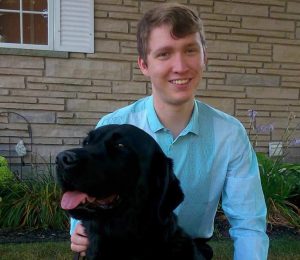‘Walk Around With Your Blindness As a Badge of Triumph’
Doctors diagnosed Jack McCormick in high school with Leber congenital amaurosis due to mutations in the RPE65 gene. With a mix of feelings about his diagnosis, it was when he accepted his visual impairment that he began evolving into the young and innovative leader he is today.
Jack is smart, funny, creative, articulate, compassionate. The 20-year-old also has a passion for inclusion and he is an advocate for accessibility on all fronts.
He is an honors business student at Canada’s Wilfrid Laurier University in Waterloo, Ontario, and he is a member of the National Young Leaders Program for the Foundation Fighting Blindness.

Jack McCormick and his guide dog Jake. Submitted.
For a long time, Jack, like many blind or visually impaired people, worked hard at hiding his blindness; he didn’t want people to judge him because of it. But all of that changed in his senior year of high school when he got Jake, his beloved guide dog. Jake immediately made Jack feel like he was wearing a sticker that said, “Hey, I can’t see,” which meant no more hiding.
Acceptance leads to respect and opens pathways to social accessibility and, in turn, helps fuel research, Jack explained before an international audience in Toronto at the Foundation Fighting Blindness Vision Quest 2016 conference.
“I accepted it in myself and that is the most important thing you can do,” he said. “To accept it in yourself and be so confident about it that you walk around with your blindness as a badge of triumph rather than a badge of sorrow or something you’re trying to hide.
“And in doing that, people are going to be very committed to you, they’re going to respect you and respect is a very powerful thing.”
That respect continues in social situations, such as securing a job, and in fostering research, because people will know that blindness is an issue.
“It’s visible,” he said. “If the community sees it, they know it exists. If you’re hiding it, no one knows.”
Along with acceptance, Jack encourages people with blindness to tell their story. “The most powerful thing in your life is your story, so share it. Share it. Because when you do, other people will hear it and they will tell other people and then you’ll have the opportunity to share it with more people and it’s a spiral.”
You can hear more from Jack in his “College Connection” column that appears in our quarterly newsletter, “Seeing Hope,” and on his personal blog. Watch a video about Jack.
